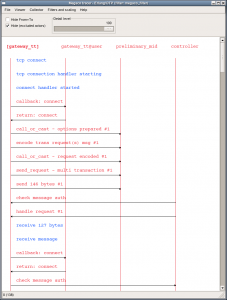从Megaco学如何写诊断代码
April 1st, 2010
原创文章,转载请注明: 转载自系统技术非业余研究
本文链接地址: 从Megaco学如何写诊断代码
Megaco/H.248 is a protocol for control of elements in a physically decomposed multimedia gateway, enabling separation of call control from media conversion. A Media Gateway Controller (MGC) controls one or more Media Gateways (MG).
Megaco有非常清晰的日志和诊断供我们参考, 精细到几行代码一个诊断信息, 非常好的风格. 有了这些信息对系统的运行完全了如指掌.
有3种方式:
1. 大量的调试日志, 在DEBUG方式下, 会有大量的系统允许期间的轨迹和消息
%%%---------------------------------------------------------------------- %%% Debug
%%%----------------------------------------------------------------------
-ifdef(megaco_debug).
-define(d(F,A), io:format("~w: " ++ F ++ "~n",[?MODULE|A])).
-else.
-define(d(F,A), ok).
-endif.
用起来很方便, 摘抄一段如下
?d("encode(~p) -> entry with"
"~n PackageItem: ~p"
"~n SubItem: ~p", [Scope, PackageItem, SubItem]),
2. 异常日志, 用于记录程序允许中间产生的各种各样的异常, 便于事后调查.
%%%---------------------------------------------------------------------- %%% Error/warning/info message macro(s)
%%%---------------------------------------------------------------------- -define(megaco_info(F, A),
(catch error_logger:info_msg("[ ~w : ~w : ~p ] ~n" ++ F ++ "~n", [?APPLICATION, ?MODULE, self()|A]))).
-define(megaco_warning(F, A),
(catch error_logger:warning_msg("[ ~w : ~w : ~p ] ~n" ++ F ++ "~n", [?APPLICATION, ?MODULE, self()|A]))).
-define(megaco_error(F, A),
(catch error_logger:error_msg("[ ~w : ~w : ~p ] ~n" ++ F ++ "~n",[?APPLICATION, ?MODULE, self()|A]))).
使用, 摘抄一段如下
warning_msg(F, A) ->
?megaco_warning("Transaction sender: " ++ F, A).
error_msg(F, A) ->
?megaco_error("Transaction sender: " ++ F, A).
3. Event Trace机制
先进的trace能够让系统的消息交互,运行轨迹以可视的方式体现在用户面前.
%%%----------------------------------------------------------------------
%%% Event Trace
%%%---------------------------------------------------------------------- -ifdef(megaco_trace_io).
-define(report(Level, C, Label, Contents),
io:format("*** [~s] ~p ~p *** "
"~n ~p[~p] " ++ Label ++
"~n ~p"
"~n ~p"
"~n",
[megaco:format_timestamp(now()),
self(), Level, ?MODULE, ?LINE, C, Contents])).
-else.
-define(report(Level, C, Label, Contents),
megaco:report_event(Level, ?APPLICATION, Label,
[{line, ?MODULE, ?LINE}, C | Contents])).
-endif.
-define(report_important(C, Label, Contents), ?report(20, C, Label, Contents)).
-define(report_verbose( C, Label, Contents), ?report(40, C, Label, Contents)).
-define(report_debug( C, Label, Contents), ?report(60, C, Label, Contents)).
-define(report_trace( C, Label, Contents), ?report(80, C, Label, Contents)).
使用, 摘抄一段如下
?report_trace(ReceiveHandle, "callback: syntax error", [ErrorDesc, Error]),
总结: ET很强大, 而且是专门为Megaco开发的, 目的就是能够可视化看到Megaco系统组件见的消息流程交互.
Post Footer automatically generated by wp-posturl plugin for wordpress.

真好哈哈。。至今没有用过ET。准备中。。。
ET是专门为Megaco开发的 用来显示消息包的来回交互 这不是我们梦寐以求的东西吗
不错,向牛人学习